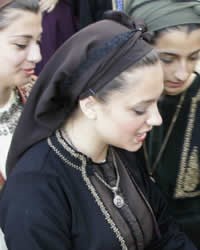Aromanian in Albania

Photo Source:
Anonymous
|
Send Joshua Project a map of this people group.
|
| People Name: | Aromanian |
| Country: | Albania |
| 10/40 Window: | Yes |
| Population: | 6,900 |
| World Population: | 207,300 |
| Primary Language: | Aromanian |
| Primary Religion: | Christianity |
| Christian Adherents: | 95.00 % |
| Evangelicals: | 0.80 % |
| Scripture: | Portions |
| Ministry Resources: | Yes |
| Jesus Film: | Yes |
| Audio Recordings: | No |
| People Cluster: | Romanian |
| Affinity Bloc: | Eurasian Peoples |
| Progress Level: |
|
Introduction / History
The Aromanian people live primarily in Greece, Albania, Romania, Serbia, Bulgaria, and North Macedonia.
Aromanian is derived from the Latin word Romanus (Roman). The leading A is a feature of the Aromanian language itself and is commonly added before words that might otherwise begin with a consonant. The Aromanian language is a Romance Language that is sometime classified as distinct from proper Romanian due to its slightly varying dialects. Due to its common language foundations dating from the time of the Latin, historians believe there was a break with linkages to the Romanian language in the 7th to 9th century period.
Aromanians are grouped into many separate branches by their geographical location. The Pindians are concentrated in and around the Pindus Mountains of northern and central Greece, the western region of North Macedonia, and southern Albania. The Gramustians live in and around the Gramos Mountains in the western-most region of North Macedonia, western Greece, and southeastern Albania. The Muzachairs live in Muzachia, Albania. The Farsherots live in Pharsala, Thessaly, Greece. The Moscopolitans are from the city of Moscopole, Albania.
The Pindian, Gramustian, and Muzachair people groups refer to themselves as Armanj in Aromanian while the Farsherots, who have a distinct dialect, refer to themselves as Rramanj. Most Aromanian people are called Vlahi in Greek, Vlach in the Balkan regional languages and Chobans in Turkish.
The more credible theory about the origin of the Aromanians shows them descending from the Romanized Thracians, Roman colonists and soldiers, and Latin Greeks (Greco-Romans). The Aromanians realized periods of political autonomy amidst the centuries of upheaval and uncertainty in their regions.
What Are Their Lives Like?
The last Aromanian church and school closed more than 50 years ago. Efforts to preserve Aromanian culture and language have failed to prevent the extinction of the same due to the lack of government support and strong cultural disapproval of the majority culture. Aromanian children are discouraged by their parents from using the language or promoting cultural elements of their history. Debate continues as to the value of preserving this ancient language and culture but no progress has been made recently. They tend to blend in with the Albanian majority.
Many people of Aromanian descent are prominent in Albania s public and private life. Sports, art, science, music, business, politics and clergy are several of the endeavors undertaken by many Aromanian people.
What Are Their Beliefs?
Most Aromanians are Christian, usually Roman Catholic.
What Are Their Needs?
The Aromanians need to put all their faith in Jesus Christ rather than an institution.
Prayer Points
Pray for a spiritual revival among the Aromanians that will bless them in every way.
Pray for Aromanian disciples to make more disciples.
Pray for Jesus to be central in their churches and families.